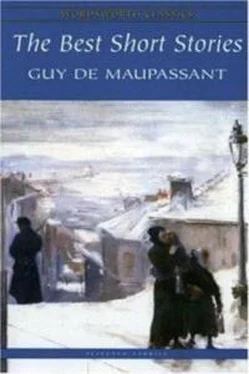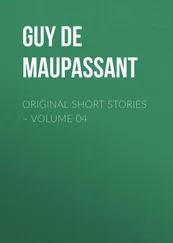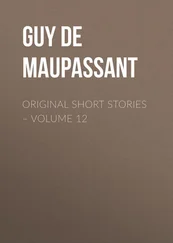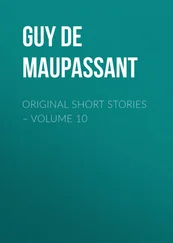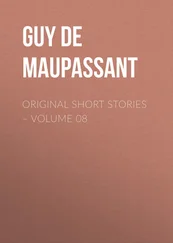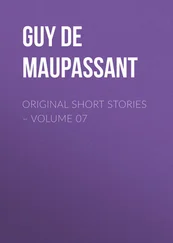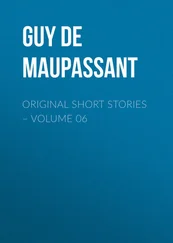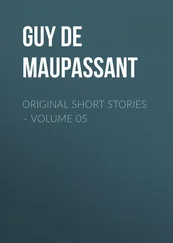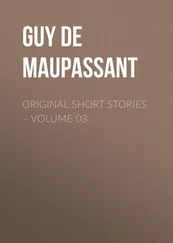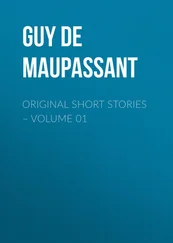"We came to the church, but the door was closed; the priest was late.
"Then the nurse sat down on one of the steps and began to undress the child. At first I thought there must have been some slight accident, but I saw that they were leaving the poor little fellow naked completely naked, in the icy air. Furious at such imprudence, I protested:
"'Why, you are crazy! You will kill the child!'
"The woman answered quietly: 'Oh, no, sir; he must wait naked before the Lord.'
"The father and the aunt looked on undisturbed. It was the custom. If it were not adhered to misfortune was sure to attend the little one.
"I scolded, threatened and pleaded. I used force to try to cover the frail creature. All was in vain. The nurse ran away from me through the snow, and the body of the little one turned purple. I was about to leave these brutes when I saw the priest coming across the country, followed. by the sexton and a young boy. I ran towards him and gave vent to my indignation. He showed no surprise nor did he quicken his pace in the least. He answered:
"'What can you expect, sir? It's the custom. They all do it, and it's of no use trying to stop them.'
"'But at least hurry up!' I cried.
"He answered: 'But I can't go any faster.'
"He entered the vestry, while we remained outside on the church steps. I was suffering. But what about the poor little creature who was howling from the effects of the biting cold.
"At last the door opened. He went into the church. But the poor child had to remain naked throughout the ceremony. It was interminable. The priest stammered over the Latin words and mispronounced them horribly. He walked slowly and with a ponderous tread. His white surplice chilled my heart. It seemed as though, in the name of a pitiless and barbarous god, he had wrapped himself in another kind of snow in order to torture this little piece of humanity that suffered so from the cold.
"Finally the christening was finished according to the rites and I saw the nurse once more take the frozen, moaning child and wrap it up in the blanket.
"The priest said to me: 'Do you wish to sign the register?'
"Turning to my gardener, I said: 'Hurry up and get home quickly so that you can warm that child.' I gave him some advice so as to ward off, if not too late, a bad attack of pneumonia. He promised to follow my instructions and left with his sister–in–law and the nurse. I followed the priest into the vestry, and when I had signed he demanded five francs for expenses.
"As I had already given the father ten francs, I refused to pay twice. The priest threatened to destroy the paper and to annul the ceremony. I, in turn, threatened him with the district attorney. The dispute was long, and I finally paid five francs.
"As soon as I reached home I went down to Kerandec's to find out whether everything was all right. Neither father, nor sister–in–law, nor nurse had yet returned. The mother, who had remained alone, was in bed, shivering with cold and starving, for she had had nothing to eat since the day before.
"'Where the deuce can they have gone?' I asked. She answered without surprise or anger, 'They're going to drink something to celebrate: It was the custom. Then I thought, of my ten francs which were to pay the church and would doubtless pay for the alcohol.
"I sent some broth to the mother and ordered a good fire to be built in the room. I was uneasy and furious and promised myself to drive out these brutes, wondering with terror what was going to happen to the poor infant.
"It was already six, and they had not yet returned. I told my servant to wait for them and I went to bed. I soon fell asleep and slept like a top. At daybreak I was awakened by my servant, who was bringing me my hot water.
"As soon as my eyes were open I asked: 'How about Kerandec?'
"The man hesitated and then stammered: 'Oh! he came back, all right, after midnight, and so drunk that he couldn't walk, and so were Kermagan and the nurse. I guess they must have slept in a ditch, for the little one died and they never even noticed it.'
"I jumped up out of bed, crying:
"'What! The child is dead?'
"'Yes, sir. They brought it back to Mother Kerandec. When she saw it she began to cry, and now they are making her drink to console her.'
"'What's that? They are making her drink!'
"'Yes, sir. I only found it out this morning. As Kerandec had no more brandy or money, he took some wood alcohol, which monsieur gave him for the lamp, and all four of them are now drinking that. The mother is feeling pretty sick now.'
"I had hastily put on some clothes, and seizing a stick, with the intention of applying it to the backs of these human beasts, I hastened towards the gardener's house.
"The mother was raving drunk beside the blue body of her dead baby. Kerandec, the nurse, and the Kermagan woman were snoring on the floor. I had to take care of the mother, who died towards noon."
The old doctor was silent. He took up the brandy–bottle and poured out another glass. He held it up to the lamp, and the light streaming through it imparted to the liquid the amber color of molten topaz. With one gulp he swallowed the treacherous drink.
The Farmer's Wife
Said the Baron Rene du Treilles to me:
"Will you come and open the hunting season with me at my farm at Marinville? I shall be delighted if you will, my dear boy. In the first place, I am all alone. It is rather a difficult ground to get at, and the place I live in is so primitive that I can invite only my most intimate friends."
I accepted his invitation, and on Saturday we set off on the train going to Normandy. We alighted at a station called Almivare, and Baron Rene, pointing to a carryall drawn by a timid horse and driven by a big countryman with white hair, said:
"Here is our equipage, my dear boy."
The driver extended his hand to his landlord, and the baron pressed it warmly, asking:
"Well, Maitre Lebrument, how are you?"
"Always the same, M'sieu le Baron."
We jumped into this swinging hencoop perched on two enormous wheels, and the young horse, after a violent swerve, started into a gallop, pitching us into the air like balls. Every fall backward on the wooden bench gave me the most dreadful pain.
The peasant kept repeating in his calm, monotonous voice:
"There, there! All right all right, Moutard, all right!"
But Moutard scarcely heard, and kept capering along like a goat.
Our two dogs behind us, in the empty part of the hencoop, were standing up and sniffing the air of the plains, where they scented game.
The baron gazed with a sad eye into the distance at the vast Norman landscape, undulating and melancholy, like an immense English park, where the farmyards, surrounded by two or four rows of trees and full of dwarfed apple trees which hid the houses, gave a vista as far as the eye could see of forest trees, copses and shrubbery such as landscape gardeners look for in laying out the boundaries of princely estates.
And Rene du Treilles suddenly exclaimed:
"I love this soil; I have my very roots in it."
He was a pure Norman, tall and strong, with a slight paunch, and of the old race of adventurers who went to found kingdoms on the shores of every ocean. He was about fifty years of age, ten years less perhaps than the farmer who was driving us.
The latter was a lean peasant, all skin and bone, one of those men who live a hundred years.
After two hours' travelling over stony roads, across that green and monotonous plain, the vehicle entered one of those orchard farmyards and drew up before in old structure falling into decay, where an old maid–servant stood waiting beside a young fellow, who took charge of the horse.
We entered the farmhouse. The smoky kitchen was high and spacious. The copper utensils and the crockery shone in the reflection of the hearth. A cat lay asleep on a chair, a dog under the table. One perceived an odor of milk, apples, smoke, that indescribable smell peculiar to old farmhouses; the odor of the earth, of the walls, of furniture, the odor of spilled stale soup, of former wash–days and of former inhabitants, the smell of animals and of human beings combined, of things and of persons, the odor of time, and of things that have passed away.
Читать дальше
